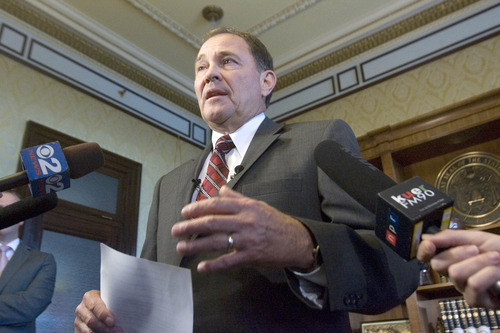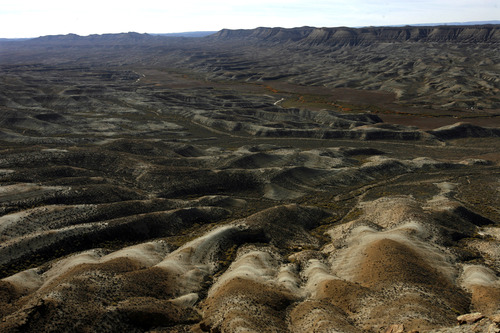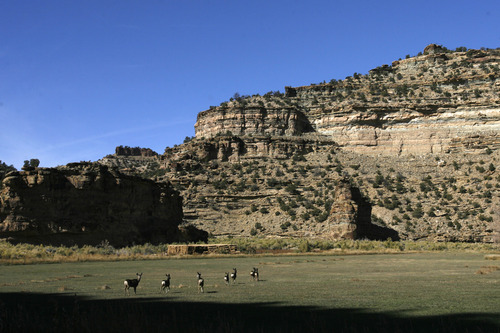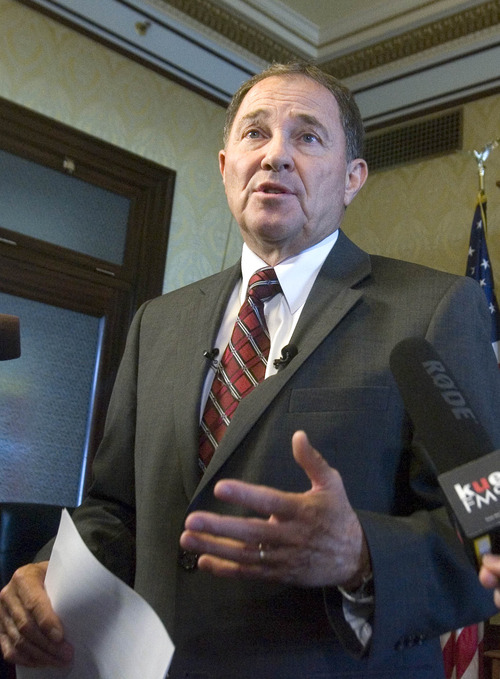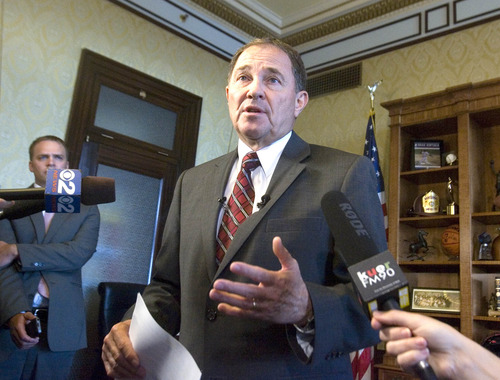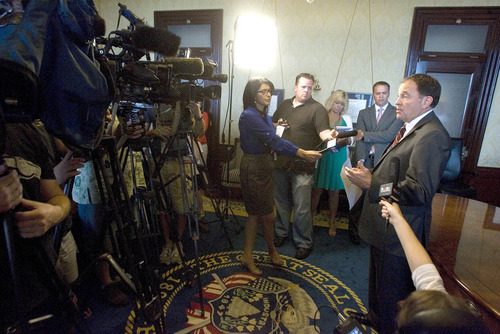This is an archived article that was published on sltrib.com in 2013, and information in the article may be outdated. It is provided only for personal research purposes and may not be reprinted.
Citing ongoing efforts to safeguard the Book Cliffs' great hunting, Gov. Gary Herbert is urging state land managers to not lease key pieces of the iconic eastern Utah landscape for oil exploration.
A haven for wildlife, particularly trophy elk, unroaded terrain in the area should be traded for federal lands that don't hold such strong wildlife values, sportsmen's groups insist. In a meeting with reporters Tuesday, Herbert said he agrees this approach would yield greater returns to the permanent school fund supported by revenues off state lands.
An Aug. 20 decision by the Utah School and Institutional Trust Lands Administration (SITLA) to lease 96,000 acres in the Book Cliffs "is flawed in the process and even more flawed in the potential outcomes," he said.
The governor asked the independent agency, which administers 3.3 million acres to financially benefit public education, to hold off executing a contract with Anadarko E&P Onshore LLC.
"We respect the governor and we will take his concerns under advisement," SITLA's deputy director Kim Christy said in response.
Anadarko hopes to begin seismic exploration for oil in the roaded parts of the lease area as early as this fall. Developing this section is not so controversial because it has already been drilled and grazed. Herbert is most concerned with the southern most 20,000 acres, unroaded canyons teeming with charismatic wildlife and providing a rare primitive hunting experience.
"The lower roadless area has tremendous values beyond traditional energy resources and their conservation is a worthwhile endeavor," said Rep. Rob Bishop, R-Utah, who is leading efforts to achieve a "grand bargain" to settle eastern Utah's long-standing land-use battles. "We intend to work with all parties involved to ensure that everyone gains something. We continue to make great progress toward creating policies that will allow for energy development, outdoor recreation, and habitat conservation."
The governor, a champion of energy development, praised SITLA's success at optimizing returns off state lands, but he is concerned that its board was unaware of the broader ramifications of leasing this portion of its Book Cliffs holdings. Opening Bogart and neighboring canyons to energy development might jeopardize the area's longer-term prospects.
"I urge SITLA to reconsider this critical decision," Herbert said, "and not execute a contract on these terms."
However, those terms carry a full 17 percent royalty, which would be diluted to 6 percent were these holdings traded for federal lands, according to Christy. Education backers say the call on whether to lease is best left to the seven-member SITLA board.
"It should not be the political judgment of the executive branch," said Tim Donaldson, a state education official who oversees the school land trust. "This proposal the board approved is in the best interests of the school trust clearly. It meets three of the governor's four economic-development priorities. It is generating money for education, developing energy and creating jobs."
The Anadarko deal could deliver hundreds of millions to the school trust if the company finds oil, Christy said. About half of the money now entering the permanent fund comes from oil and gas. Income from the fund delivered about $29 million to Utah schools last year, accounting for about 1 percent of the state's education spending.
The governor's position pleased sportsmen's groups, which had identified the Book Cliffs as the No. 1 candidate for conservation in the public lands initiative pushed by Utah's congressional delegation.
"The governor clearly indicates that he believes an amenable solution can be reached among all the stakeholders involved to satisfy both SITLA's fiduciary responsibilities while protecting Utah's heritage of maintaining 'wild places and wild things' for future generations. Utah's schoolchildren deserve nothing less," said Ken Theis, Utah coordinator for Backcountry Hunters and Anglers.
Although SITLA has managed the unroaded parts of the Book Cliffs for wildlife in the past, the goal behind assembling this block through land exchanges has always been to develop its mineral potential.
"To unravel all that effort is an awkward posture to take," Christy said. "We aren't opposing Rep. Bishop's efforts. But never have we have advocated making this piece a candidate for exchange."


